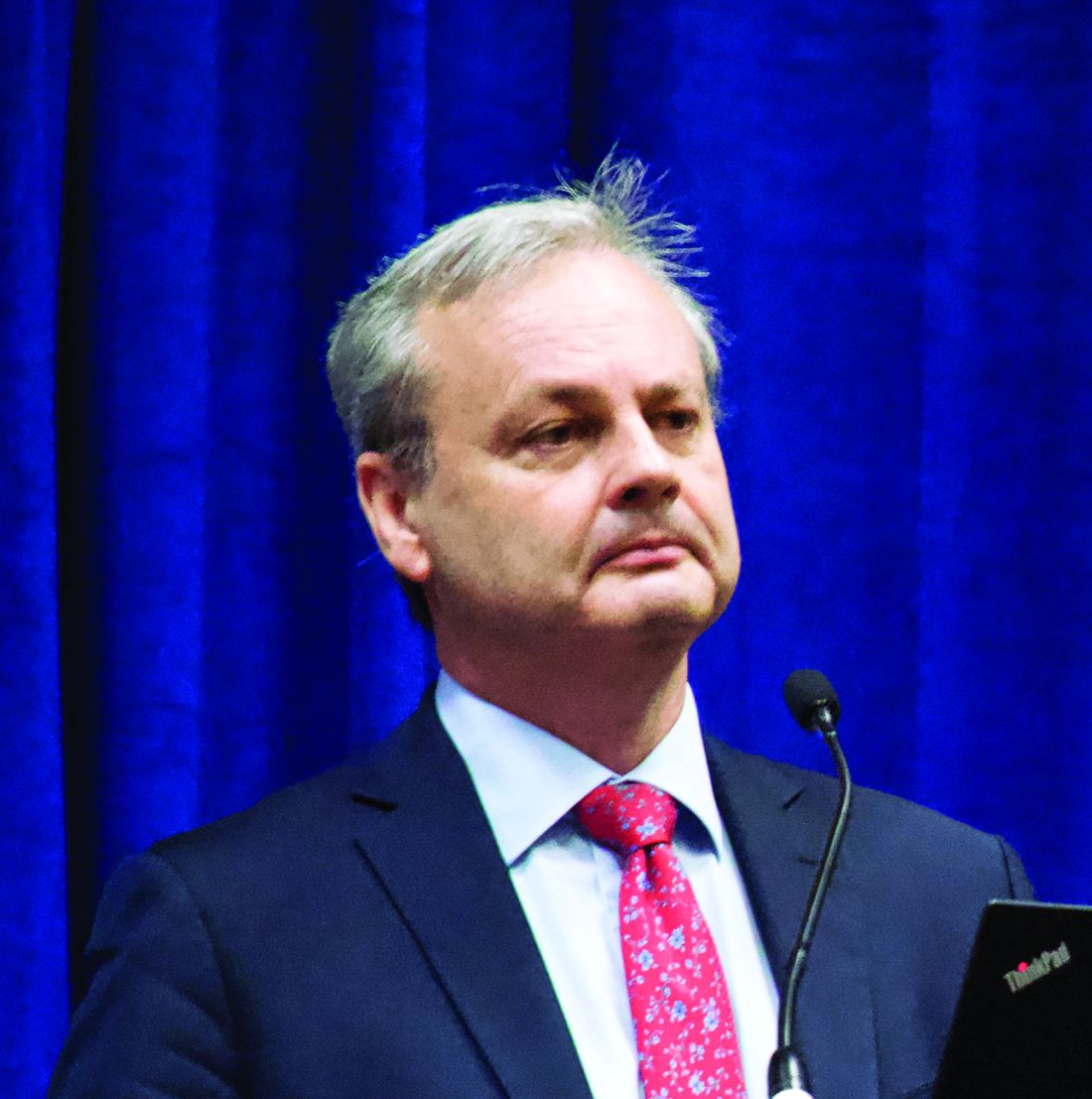User login
SAN ANTONIO – Residual cancer burden (RCB) is poised to alter American Joint Committee on Cancer (AJCC) staging standards in breast cancer, according to investigators.
A meta-analysis showed that RCB – which is calculated in the neoadjuvant setting through a combination of primary tumor bed cellularity, lymph node positivity, and size of largest metastasis – was significantly associated with long-term survival of more than 5,000 breast cancer patients, reported principal investigator W. Fraser Symmans, MD, of MD Anderson Cancer Center, Houston, who presented the findings at the San Antonio Breast Cancer Symposium.
Coinvestigator Laura J. Esserman, MD, of the University of California, San Francisco, who was in attendance at Dr. Symmans’ presentation, put the study in context.
“The reason we did this meta-analysis was to really change the joint commission – the AJCC staging – and we expect that will happen on the basis of these results,” Dr. Esserman said. “[RBC] is, moving forward, the standard of care.”
The investigators analyzed individual-level data from 5,160 patients treated at multiple institutions. For each patient, RCB, which is scored from 0 to III, from pathologic complete response (0) to high disease burden (III), was compared with event-free survival (EFS) and disease relapse-free survival (DRFS).
The results showed that both EFS and DRFS were strongly associated with RCB for the overall population and each subtype. For instance, for triple-negative breast cancer, patients with pathologic complete response had a 10-year EFS of 86%, a rate that decreased as RCB increased from RCB-I (75%) to RCB-II (61%), and finally, RCB-III (25%). This trend was similar for patients with HR-negative/HER2-positive or HR-positive/HER2-positive disease. Risk stratification for HR-positive/HER2-negative disease deviated slightly; pathologic complete response was associated with a 10-year EFS of 81%, compared with 86% for RCB-I.
Regarding this finding, Dr. Symmans noted that RCB is most prognostic when higher levels of residual disease are present. Still, reviewing long-term risk across subtypes, Dr. Fraser emphasized the reliability of RCB as a prognostic tool.
“The strong relationship [between RCB and] risk is very clear in each and every subtype of disease,” he said. “There are very tight confidence intervals around those risk estimates.”
Multivariate analysis provided further support for this conclusion, as RCB was independently prognostic for survival in each subtype of disease.
According to Dr. Esserman, the study findings should encourage implementation of RCB in daily practice.
“There has to be training and a commitment to using this in a consistent way so that we can all rely on the information,” Dr. Esserman said. “This is critical for our patients, and this is ... how we’re going to get people to the best outcome, and [it should be done] up front, when we still have the chance to cure people.”
Session moderator Virginia Kaklamani, MD, of Mays Cancer Center, San Antonio, agreed that clinicians should use RCB in practice; however, she also explained that RCB results for some patients are not yet actionable.
“I ask my pathologist to give me the RCB score,” Dr. Kaklamani said. “The question is, what do I do with the results? It’s a little limited. In triple-negative patients I may consider giving capecitabine in the adjuvant setting, or obviously enrolling them in clinical trials. In my HER2-positive patients, I will look at the results from the KATHERINE trial and the ExteNET trial to guide me. In my HR-positive patients, I’m still waiting for results from other trials to see how these results can be interpreted. What we’ve [found] is in many trials, achieving a pathologic complete response in HR-positive patients may not be as important, but as you can see here, it looks like RCB really is.”
The investigators disclosed relationships with Seattle Genetics, Almac, Syndax, and others.
SOURCE: Yau et al. SABCS. 2019 Dec 13. Abstract GS5-01.
SAN ANTONIO – Residual cancer burden (RCB) is poised to alter American Joint Committee on Cancer (AJCC) staging standards in breast cancer, according to investigators.
A meta-analysis showed that RCB – which is calculated in the neoadjuvant setting through a combination of primary tumor bed cellularity, lymph node positivity, and size of largest metastasis – was significantly associated with long-term survival of more than 5,000 breast cancer patients, reported principal investigator W. Fraser Symmans, MD, of MD Anderson Cancer Center, Houston, who presented the findings at the San Antonio Breast Cancer Symposium.
Coinvestigator Laura J. Esserman, MD, of the University of California, San Francisco, who was in attendance at Dr. Symmans’ presentation, put the study in context.
“The reason we did this meta-analysis was to really change the joint commission – the AJCC staging – and we expect that will happen on the basis of these results,” Dr. Esserman said. “[RBC] is, moving forward, the standard of care.”
The investigators analyzed individual-level data from 5,160 patients treated at multiple institutions. For each patient, RCB, which is scored from 0 to III, from pathologic complete response (0) to high disease burden (III), was compared with event-free survival (EFS) and disease relapse-free survival (DRFS).
The results showed that both EFS and DRFS were strongly associated with RCB for the overall population and each subtype. For instance, for triple-negative breast cancer, patients with pathologic complete response had a 10-year EFS of 86%, a rate that decreased as RCB increased from RCB-I (75%) to RCB-II (61%), and finally, RCB-III (25%). This trend was similar for patients with HR-negative/HER2-positive or HR-positive/HER2-positive disease. Risk stratification for HR-positive/HER2-negative disease deviated slightly; pathologic complete response was associated with a 10-year EFS of 81%, compared with 86% for RCB-I.
Regarding this finding, Dr. Symmans noted that RCB is most prognostic when higher levels of residual disease are present. Still, reviewing long-term risk across subtypes, Dr. Fraser emphasized the reliability of RCB as a prognostic tool.
“The strong relationship [between RCB and] risk is very clear in each and every subtype of disease,” he said. “There are very tight confidence intervals around those risk estimates.”
Multivariate analysis provided further support for this conclusion, as RCB was independently prognostic for survival in each subtype of disease.
According to Dr. Esserman, the study findings should encourage implementation of RCB in daily practice.
“There has to be training and a commitment to using this in a consistent way so that we can all rely on the information,” Dr. Esserman said. “This is critical for our patients, and this is ... how we’re going to get people to the best outcome, and [it should be done] up front, when we still have the chance to cure people.”
Session moderator Virginia Kaklamani, MD, of Mays Cancer Center, San Antonio, agreed that clinicians should use RCB in practice; however, she also explained that RCB results for some patients are not yet actionable.
“I ask my pathologist to give me the RCB score,” Dr. Kaklamani said. “The question is, what do I do with the results? It’s a little limited. In triple-negative patients I may consider giving capecitabine in the adjuvant setting, or obviously enrolling them in clinical trials. In my HER2-positive patients, I will look at the results from the KATHERINE trial and the ExteNET trial to guide me. In my HR-positive patients, I’m still waiting for results from other trials to see how these results can be interpreted. What we’ve [found] is in many trials, achieving a pathologic complete response in HR-positive patients may not be as important, but as you can see here, it looks like RCB really is.”
The investigators disclosed relationships with Seattle Genetics, Almac, Syndax, and others.
SOURCE: Yau et al. SABCS. 2019 Dec 13. Abstract GS5-01.
SAN ANTONIO – Residual cancer burden (RCB) is poised to alter American Joint Committee on Cancer (AJCC) staging standards in breast cancer, according to investigators.
A meta-analysis showed that RCB – which is calculated in the neoadjuvant setting through a combination of primary tumor bed cellularity, lymph node positivity, and size of largest metastasis – was significantly associated with long-term survival of more than 5,000 breast cancer patients, reported principal investigator W. Fraser Symmans, MD, of MD Anderson Cancer Center, Houston, who presented the findings at the San Antonio Breast Cancer Symposium.
Coinvestigator Laura J. Esserman, MD, of the University of California, San Francisco, who was in attendance at Dr. Symmans’ presentation, put the study in context.
“The reason we did this meta-analysis was to really change the joint commission – the AJCC staging – and we expect that will happen on the basis of these results,” Dr. Esserman said. “[RBC] is, moving forward, the standard of care.”
The investigators analyzed individual-level data from 5,160 patients treated at multiple institutions. For each patient, RCB, which is scored from 0 to III, from pathologic complete response (0) to high disease burden (III), was compared with event-free survival (EFS) and disease relapse-free survival (DRFS).
The results showed that both EFS and DRFS were strongly associated with RCB for the overall population and each subtype. For instance, for triple-negative breast cancer, patients with pathologic complete response had a 10-year EFS of 86%, a rate that decreased as RCB increased from RCB-I (75%) to RCB-II (61%), and finally, RCB-III (25%). This trend was similar for patients with HR-negative/HER2-positive or HR-positive/HER2-positive disease. Risk stratification for HR-positive/HER2-negative disease deviated slightly; pathologic complete response was associated with a 10-year EFS of 81%, compared with 86% for RCB-I.
Regarding this finding, Dr. Symmans noted that RCB is most prognostic when higher levels of residual disease are present. Still, reviewing long-term risk across subtypes, Dr. Fraser emphasized the reliability of RCB as a prognostic tool.
“The strong relationship [between RCB and] risk is very clear in each and every subtype of disease,” he said. “There are very tight confidence intervals around those risk estimates.”
Multivariate analysis provided further support for this conclusion, as RCB was independently prognostic for survival in each subtype of disease.
According to Dr. Esserman, the study findings should encourage implementation of RCB in daily practice.
“There has to be training and a commitment to using this in a consistent way so that we can all rely on the information,” Dr. Esserman said. “This is critical for our patients, and this is ... how we’re going to get people to the best outcome, and [it should be done] up front, when we still have the chance to cure people.”
Session moderator Virginia Kaklamani, MD, of Mays Cancer Center, San Antonio, agreed that clinicians should use RCB in practice; however, she also explained that RCB results for some patients are not yet actionable.
“I ask my pathologist to give me the RCB score,” Dr. Kaklamani said. “The question is, what do I do with the results? It’s a little limited. In triple-negative patients I may consider giving capecitabine in the adjuvant setting, or obviously enrolling them in clinical trials. In my HER2-positive patients, I will look at the results from the KATHERINE trial and the ExteNET trial to guide me. In my HR-positive patients, I’m still waiting for results from other trials to see how these results can be interpreted. What we’ve [found] is in many trials, achieving a pathologic complete response in HR-positive patients may not be as important, but as you can see here, it looks like RCB really is.”
The investigators disclosed relationships with Seattle Genetics, Almac, Syndax, and others.
SOURCE: Yau et al. SABCS. 2019 Dec 13. Abstract GS5-01.
REPORTING FROM SABCS 2019



